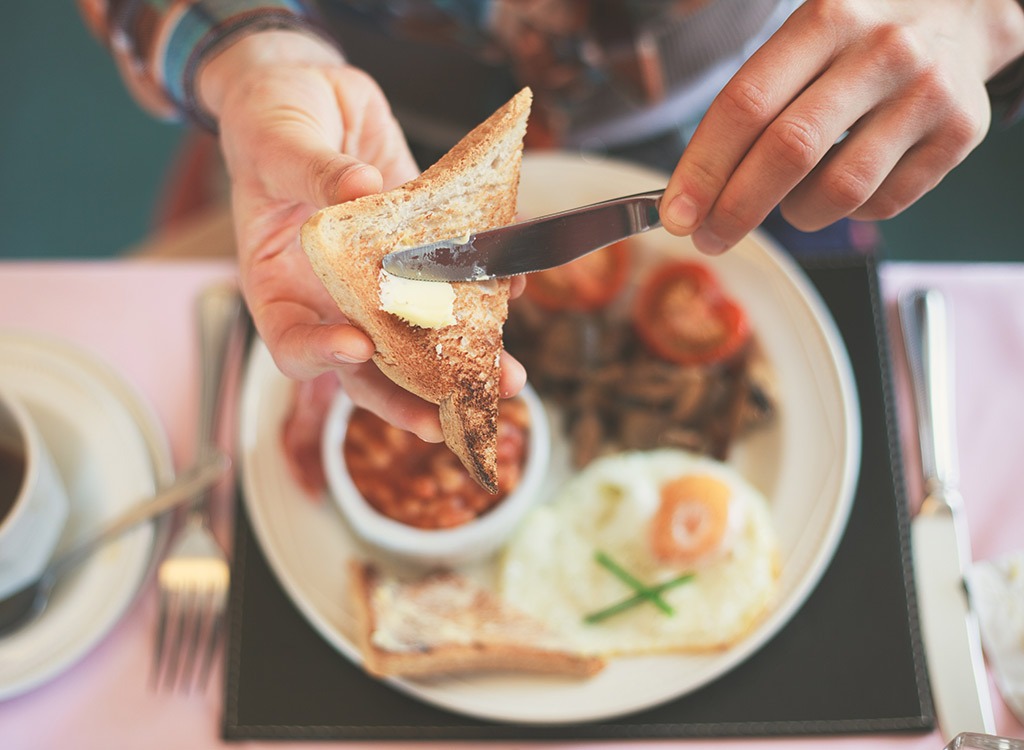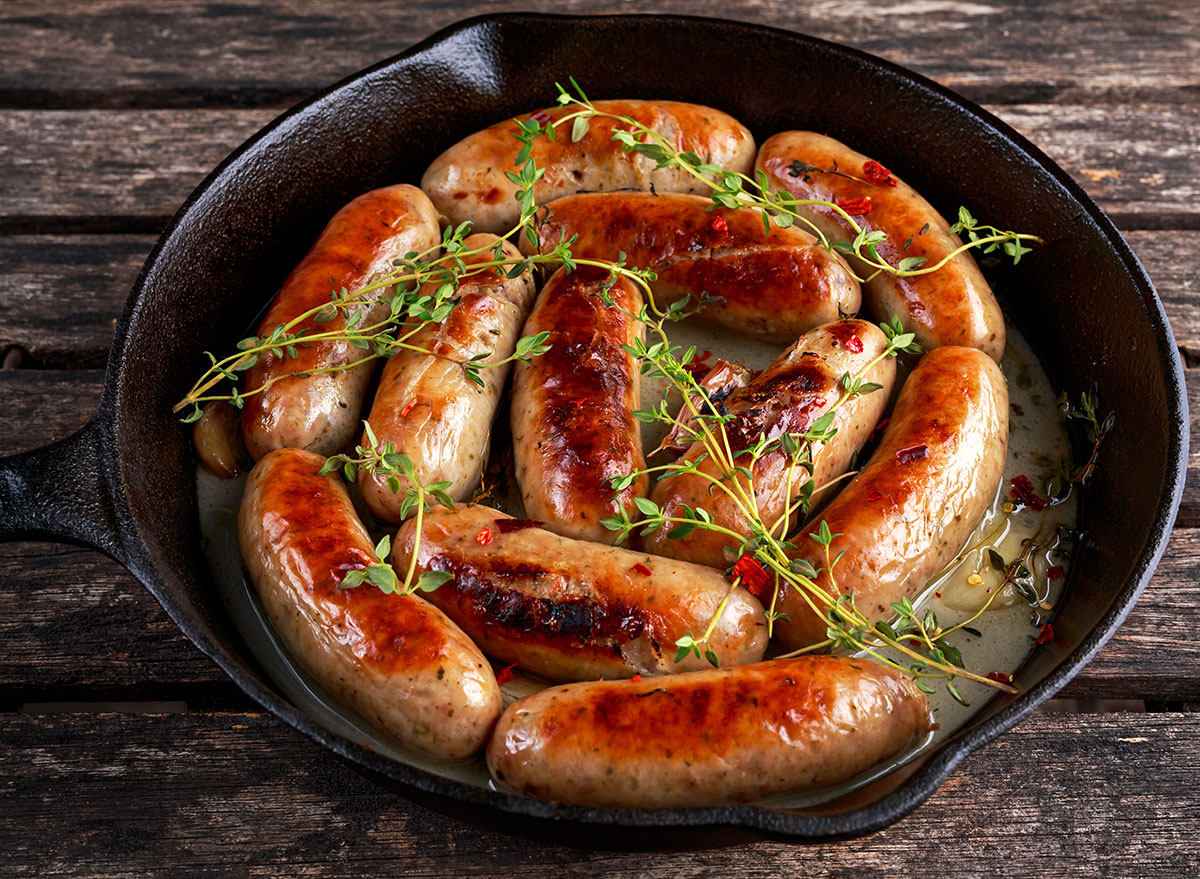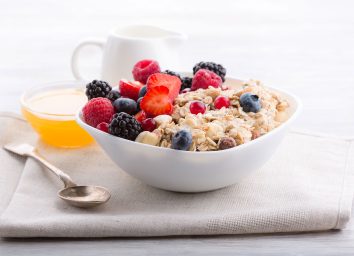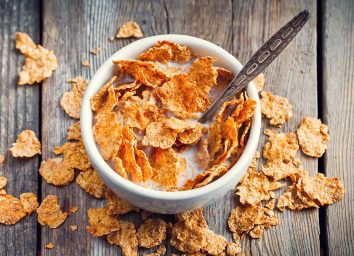Breakfast Habits Your Doctor Wants You To Quit Immediately

Every year, doctors are responsible for diagnosing Americans with chronic diseases: cancer, diabetes, hypertension, stroke, heart disease, respiratory diseases, arthritis, and obesity. To date, nearly half (approximately 45%, or 133 million) of Americans are currently living with at least one of these diseases, according to an International Journal of Environmental Research and Public Health study.
The Center for Science in the Public Interest (CSPI) reports that one of the leading causes of this increased risk (and diagnosis) of many of these chronic diseases is an unhealthy diet. In fact, the CSPI highlights that having an unhealthy diet contributes to approximately 678,000 deaths each year in the U.S., making poor nutrition one of the leading causes of death in the U.S. alongside physical inactivity.
Although most general practitioners give very little dietary guidance to their patients—by their own admission, they aren’t experts, and you’ll want to see a Registered Dietitian Nutritionist for the best advice (see here for men and women)—they do want to support your path to better health and reduced risk of disease. One of the ways you can do that is by making changes to your diet. And what better way than to start with the first meal of the day?
So, we sought out advice from doctors who view nutrition as a critical component of care, especially when it comes to preventing disease. They don’t all agree about the habits to nix, but they are passionate about what they think you should or shouldn’t do at the breakfast table. Read on, then check out these 15 Unhealthiest Fast-Food Breakfasts.
Skipping breakfast.

It’s sounds cliché but several doctors we’ve contacted said skipping breakfast is one of the worst habits they’d recommend breaking because they feel breakfast is still “the most important meal of the day.”
“Breakfast jumpstarts our body’s metabolism,” says Madhan Kumar, MD, a surgical gastroenterologist with the virtual practice iCliniq+. Skipping breakfast leads to overeating or increased weight gain and higher body mass index (BMI) without eating more calories by reducing your metabolism, he says.
“Chances are skipping breakfast might leave you ravenous for lunch which might make it more difficult for you to make a healthy choice,” warns nutritional psychiatrist Uma Naidoo, MD, author of This is Your Brain on Food. “If you’re hungry and you haven’t had any breakfast, it’s likely you will choose the easiest, most convenient food. This may lead you to a fast-food restaurant rather than a healthier option.” Alternatively, eating a balanced breakfast “will leave you satiated until lunchtime and will set you up for nutritional success throughout the entire day,” says Dr. Naidoo.
Eating breakfast.

Some doctors we spoke with advised getting out of the breakfast-eating habit, citing the health benefits of intermittent fasting, such as weight loss, reducing inflammation and oxidative stress, and lowering insulin resistance. “I recommend stretching out that overnight fast as long as you can in the morning to avoid prediabetes and type 2 diabetes,” says DJ Polzin, DO, a traveling family medicine physician at Wild Bear Medicine, who provides telemedicine healthcare to the nomad/van-life community in Oregon and Washington out of a camper van. He suggests breaking your fast with a meal high in protein and good fats, not pancakes and sugary cereals. “If you drink coffee, take it with MCT oil (for Medium Chain Triglycerides, a healthy saturated fat like coconut oil) about an hour before you eat carbs to avoid an insulin spike,” he recommends.
Ordering the lumberjack.

For some people, breakfast is synonymous with “hardy” and “hardy breakfast” translates to a big breakfast with a lot of meat. “If there’s one bad habit I would like to see patients break out of it’s eating a huge breakfast filled with processed meat,” says renowned physician-scientist William W. Li, MD, author of Eat to Beat Disease: The New Science of How Your Body Can Health Itself. A typical lumberjack-size breakfast can top 1,200 calories and 25 grams of saturated fat. “Health risk-raising breakfast foods (in these big meals) typically include artificial sweeteners in coffee and ultra-processed foods that alter the gut microbiome, and processed meats like sausages and bacon that are considered carcinogens by the World Health Organization,” Dr. Li says. “As a swap, I recommend eating fresh fruit, yogurt, and free-range eggs.”
Related: One Major Side Effect of Eating a Big Breakfast, Says Science.
Having dessert for breakfast.

In most countries breakfast is savory. It used to be that way in the United States, too. “Somewhere along the way in the U.S. we started thinking breakfast was a form of dessert!” says Dr. Naidoo, who is also director of nutritional psychiatry at Massachusetts General Hospital and a trained chef. Doughnuts, cinnamon bagels, sugary cereals, cinnamon buns, and the like are full of added sugars and processed carbs that will set you up for making more unhealthy eating decisions later in the day, Naidoo says. Eating this way “may predispose you to insulin resistance while promoting inflammation, the number one underlying cause for several mental health conditions such as anxiety, depression, and dementia, among others,” she says.
For useful tips on breaking your sugar habit, read David Zinczenko’s book, Zero Sugar Diet: The 14-Day Plan to Flatten Your Belly, Crush Cravings, and Help Keep You Lean for Life.








